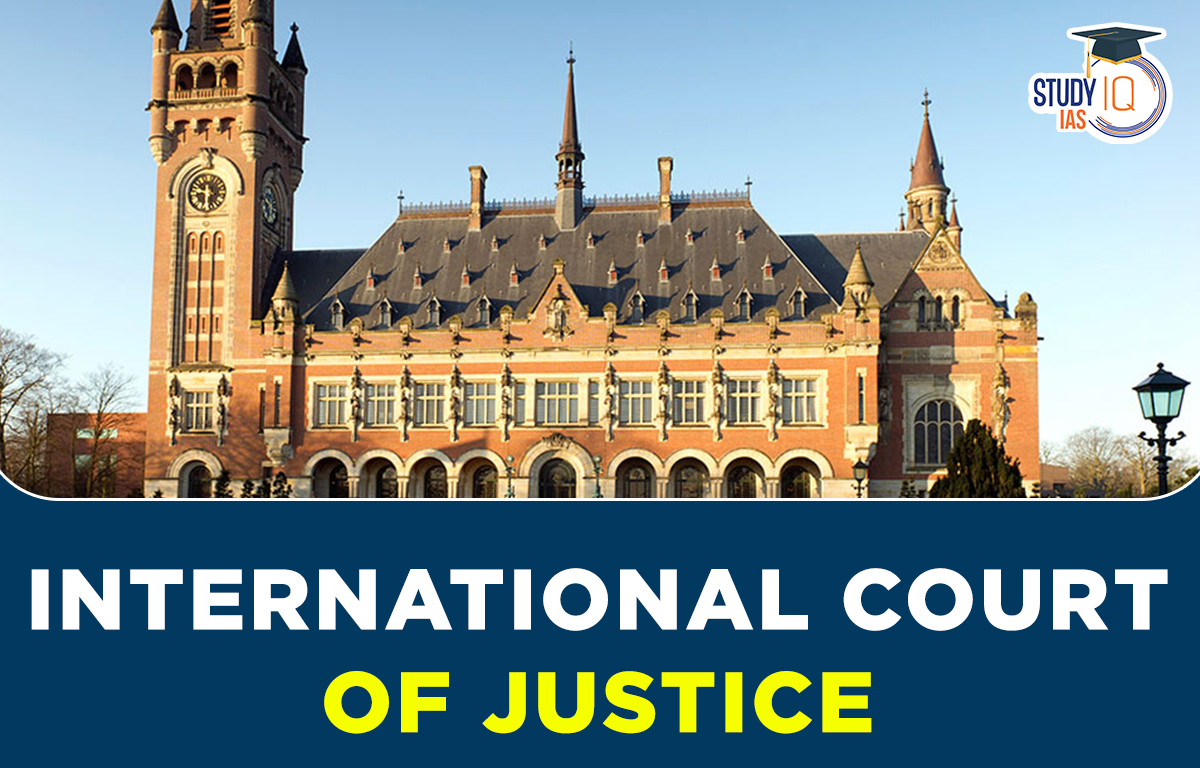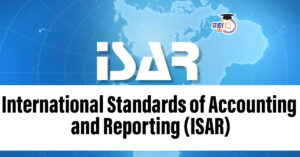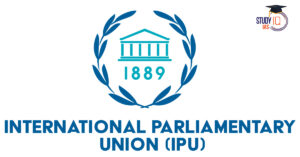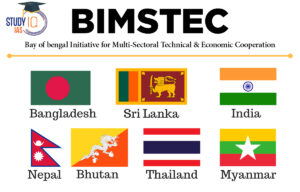Table of Contents
The International Court of Justice is hearing a landmark case on climate change obligations, initiated by Vanuatu, to determine the legal responsibilities of countries in protecting the climate system and the consequences for those causing harm.
| International Legal frameworks involved in the case |
|
International Court of Justice (ICJ)
- ICJ is the primary judicial body of the United Nations (UN).
- It was established in 1945 and is located in The Hague, Netherlands. It is the only UN principal organ not in New York.
- Purpose: To settle legal disputes between countries and to provide legal advice to authorized UN agencies and specialized organizations.
- Judges: It has 15 judges who serve nine-year terms.
- The UN General Assembly and the Security Council elect the judges, and both bodies vote separately but simultaneously.
- To be elected, a candidate must receive an absolute majority of votes in both bodies.
- Official languages: The official languages of the ICJ are English and French.
- Advisory opinions: The ICJ’s advisory opinions are not binding, but they are associated with the court’s prestige and authority. The requesting organization can choose to act on the opinion or not.
- The hearings of the ICJ are always public.
It replaced the Permanent Court of International Justice (PCIJ), which the League of Nations had created in 1920 and abolished in 1946. The UPSC Syllabus includes the International Court of Justice as a significant subject. The UPSC Mock Test can help candidates prepare for the exam with more precision.
Functions of ICJ
- Case Types: The ICJ deals with legal disputes between States (contentious cases) and advisory opinions on legal questions from UN organs and specialised agencies.
- Participation in Contentious Cases: Only member States of the United Nations or those that have accepted the Court’s jurisdiction can participate in contentious cases.
- Advisory Proceedings: Only five UN organs and 16 specialised agencies have the privilege to request advisory opinions.
- Binding Nature of Judgments: Judgments in contentious cases are final and binding on the parties involved, without the right to appeal.
- Advisory Opinions: Unlike judgments, advisory opinions of the ICJ are not legally binding.
- Legal Basis for Decisions: The ICJ bases its decisions on international law, including international conventions, customs, principles, judicial decisions, and scholarly writings.
International Court of Justice Composition
- The Court consists of 15 independent judges from different countries, elected for nine-year terms by both the UN General Assembly and the Security Council.
- Election Process: Judges must receive an absolute majority of votes in both the General Assembly and the Security Council to be elected.
- Renewal of Composition: Every three years, one-third of the Court’s composition is renewed, and judges are eligible for re-election.
- Independence of Judges: Judges do not represent their own countries or any other State and pledge to perform their duties impartially and conscientiously.
History of International Court of Justice (ICJ)
The International Court of Justice is the main court of the United Nations (UN). It was created in June 1945 by the United Nations Charter, and operations got underway in April 1946. The methods for the peaceful resolution of conflicts between states, including negotiation, investigation, mediation, and other processes, are outlined in Article 33 of the United Nations Charter. Some of these techniques involve using resources from outside sources.
The Hague Peace Conference was called in 1899 at Nicholas II’s request. The Permanent Court of Arbitration was established in 1900 and started operations in 1902 in accordance with the provisions of the 1899 Convention regarding the establishment of permanent machinery.
Between 1911 and 1919, a number of plans and suggestions for the creation of an international judicial tribunal were made by national and international organisations as well as governments. This culminated in the creation of the Permanent Court of International Justice (PCIJ). The United States’ H. Hackworth committee was charged with creating the future International Court of Justice’s statute in 1945. When the International Court of Justice met for the first time in April 1946, it officially dissolved the PCIJ and elected Judge José Gustavo Guerrero (El Salvador) as its first President.
Also Read: International Atomic Energy Agency
Jurisdiction of International Court of Justice
The Court has two areas of jurisdiction: one is that it has the authority to decide on legal disputes brought before it by States in accordance with international law (jurisdiction in contentious cases); and the other is that it can give advisory opinions on legal issues upon request from United Nations bodies, specialized agencies, or another related organization that is permitted to do so.
The Court’s authority only extends to states that are parties to the Court’s Statute or have accepted it under specific circumstances and are members of the United Nations. At the Court, states are not represented by permanent officials. Through their foreign minister or an ambassador accredited to the Netherlands, they typically interact with the registrar.
The judgment is definitive, enforceable against the parties to the action, and not subject to review. (at the most it may be subject to interpretation or, upon the discovery of a new fact, revision). A United Nations Member State acknowledges that it will abide by the Court’s ruling in any case to which it is a party by signing the Charter. The Security Council has the authority to suggest or decide on measures to be taken to give effect to the judgment if a State thinks the other party has failed to fulfil the obligations placed on it by a court judgment.
Only 16 specialized agencies of the United Nations or its affiliated organizations are permitted to participate in advisory procedures before the Court. Court opinions given in advisory hearings are generally advisory and not legally binding.
International Court of Justice Significance
Peaceful Resolution of Disputes
- The ICJ adjudicates disputes between states on matters such as territorial conflicts, maritime boundaries, sovereignty, trade, and human rights.
- Its rulings are binding on the parties involved, helping to prevent conflicts from escalating into war.
2. Promotion of International Law
- The ICJ ensures the application and development of international law by interpreting treaties, conventions, and customary practices.
- It upholds legal norms that guide states in their interactions, fostering a rules-based international order.
3. Advisory Opinions
- Upon request by the UN General Assembly, Security Council, or specialized agencies, the ICJ provides advisory opinions on legal questions.
- These opinions, though non-binding, influence international policymaking and legal frameworks.
4. Neutral and Independent Platform
- As an impartial body, the ICJ provides states with a neutral venue to address grievances, reducing the potential for bias or favoritism.
5. Strengthening Global Cooperation
- By resolving disputes peacefully and promoting respect for international law, the ICJ enhances trust and cooperation among nations.
6. Protection of Sovereignty
- The ICJ operates only when states consent to its jurisdiction, respecting the sovereignty of nations while offering a mechanism for legal redress.
ICJ and India
Four of the six ICJ cases in which India has been involved involve Pakistan. The International Court of Justice (ICJ) concluded in the Kulbhushan Jadhav case that Pakistan was obliged by international law to permit “effective review and reconsideration” of Jadhav’s conviction. Except for the Kulbhushan Jadhav case, India has participated in five ICJ cases, three of which involved Pakistan. They are listed below:
- Passage through Indian Territory (Portugal v. India, culminated 1960).
- Appeals involving the ICAO Council’s jurisdiction (India v. Pakistan, culminated 1972).
- Pakistani War Prisoners’ Trial (Pakistan v. India, culminated 1973).
- August 10, 1999, Aerial Incident (Pakistan v. India, culminated 2000).
- Obligations pertaining to talks on ending the nuclear arms race and achieving nuclear disarmament (Marshall Islands v. India, culminated 2016).
International Court of Justice Criticism
- The majority of the ICJ’s limitations are structural, circumstantial, and connected to the material resources made accessible to the Court. It lacks the power to prosecute those who have been charged with war crimes or crimes against humanity. It does not have a prosecutor who can start procedures because it is not a criminal court.
- It differs from courts in that courts can consider applications from individuals, whereas the International Court of Justice cannot, and courts deal with allegations of violations of the human rights conventions under which they were founded.
- The International Court of Justice is distinct from specialized international courts like the International Tribunal for the Law of the Sea because of its broad jurisdiction (ITLOS).
- The Court is not an appellate court of last recourse for individuals, nor is it a Supreme Court to which national courts may appeal. Additionally, it does not serve as a foreign tribunal’s court of appeal. However, it can decide whether or not arbitral judgments are legal.
- A dispute can only be heard by the Court if one or more nations ask for it. It cannot settle a disagreement on its own. Additionally, it is prohibited by its Statute from looking into and making decisions about the conduct of independent nations.
- The ICJ only has jurisdiction by agreement and lacks any mandatory jurisdiction. Because permanent members of the Security Council have the power to veto the enforcement of cases, even those to which they consented to be bound, there is not a total separation of powers.
Difference between ICC and ICJ
| Parameter | ICC (International Criminal Court) | ICJ (International Court of Justice) |
| Establishment & HQ | 2002, Hague (Netherlands) | 1946, Hague (Netherlands) |
| UN Relation | Independent- may receive case referrals from UN Security Council | Official court of the UN, known as the World Court |
| Case types | Criminal prosecution of individuals | Contentious between parties, and advisory opinions |
| Subject matter | Genocide, crimes against humanity, war crimes, crimes of aggression | Maritime disputes, sovereignty, natural resources, trade, treaty violations and treaty interpretations, human rights, etc. |
| Funding | Contributions from parties to the Rome Statute, voluntary contributions from the UN, governments, corporations, organisations, etc. | UN |


 International Standards of Accounting an...
International Standards of Accounting an...
 150th Summit of Inter-Parliamentary Unio...
150th Summit of Inter-Parliamentary Unio...
 BIMSTEC Countries 2025, Area of Cooperat...
BIMSTEC Countries 2025, Area of Cooperat...





















